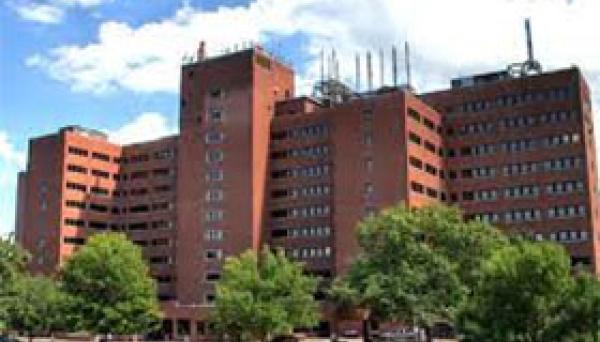Clinical Programs: Sites, Rotations and Schedule
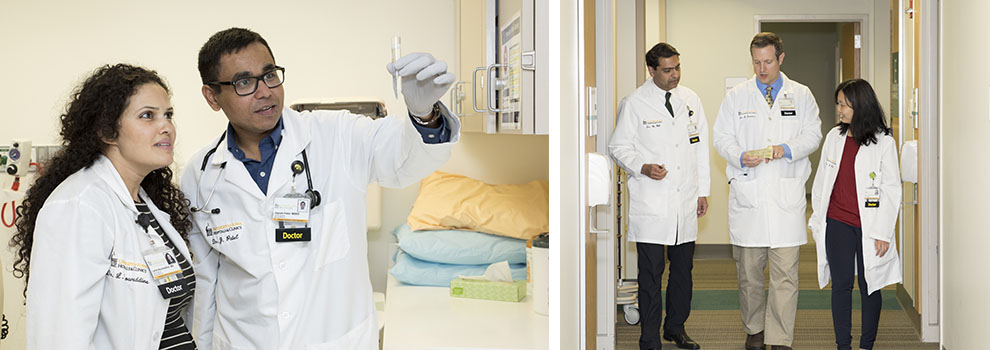
The nephrology programs at University of Iowa Hospitals & Clinics and at the Veterans Affairs Medical Center (VAMC) are highly integrated, with clinical responsibilities at both medical centers shared by members of the division.
Program Rotations
- Inpatient Renal Consultation Service
- Consultation Service UI Hospitals & Clinics
- Consultation Service VAMC
- Transplant Service
- Inpatient Transplant Service
- Transplantation Clinics
- Renal Ambulatory Clinics
- Continuity of Care (COC) clinic
- Rare Renal Disease/Renal Genetics Clinic
- Renal Stone Clinic
- VAMC Clinic
- Dialysis Program
- Center Dialysis
- Home Dialysis Program
- Continuous Renal Replacement Therapies
Program Schedule
The schedule below approximates the time the fellows spend on each of the services in the first and second years of training.
| UIHC Consult A Team |
UIHC Consult B Team |
VA Consults | IP TXP | OP TXP | Ambulatory/ Research/ Vacation |
Electives | |
|---|---|---|---|---|---|---|---|
| Year 1 | 6 | 5-6 | 4 | 4 | 0 | 4 | 1-2 |
| Year 2 | 4 | 4 | 4 | 1-2 | 2 | 6-7 | 2-3 |
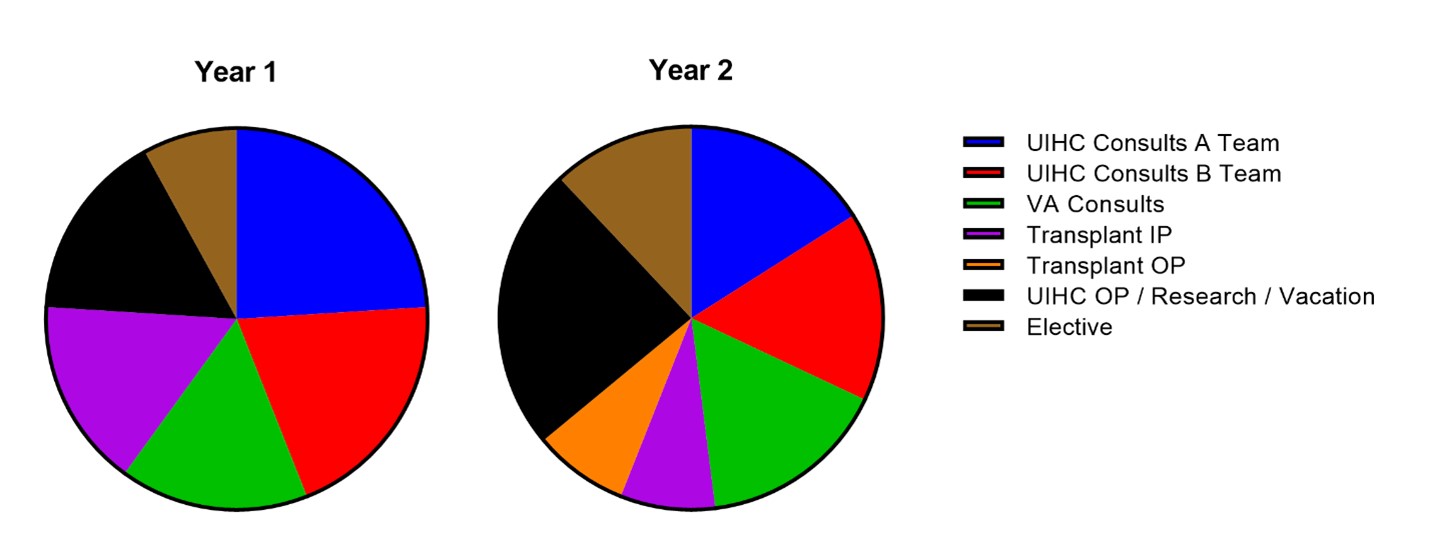
Inpatient Renal Consultation Service
Consultation Service UI Hospitals & Clinics
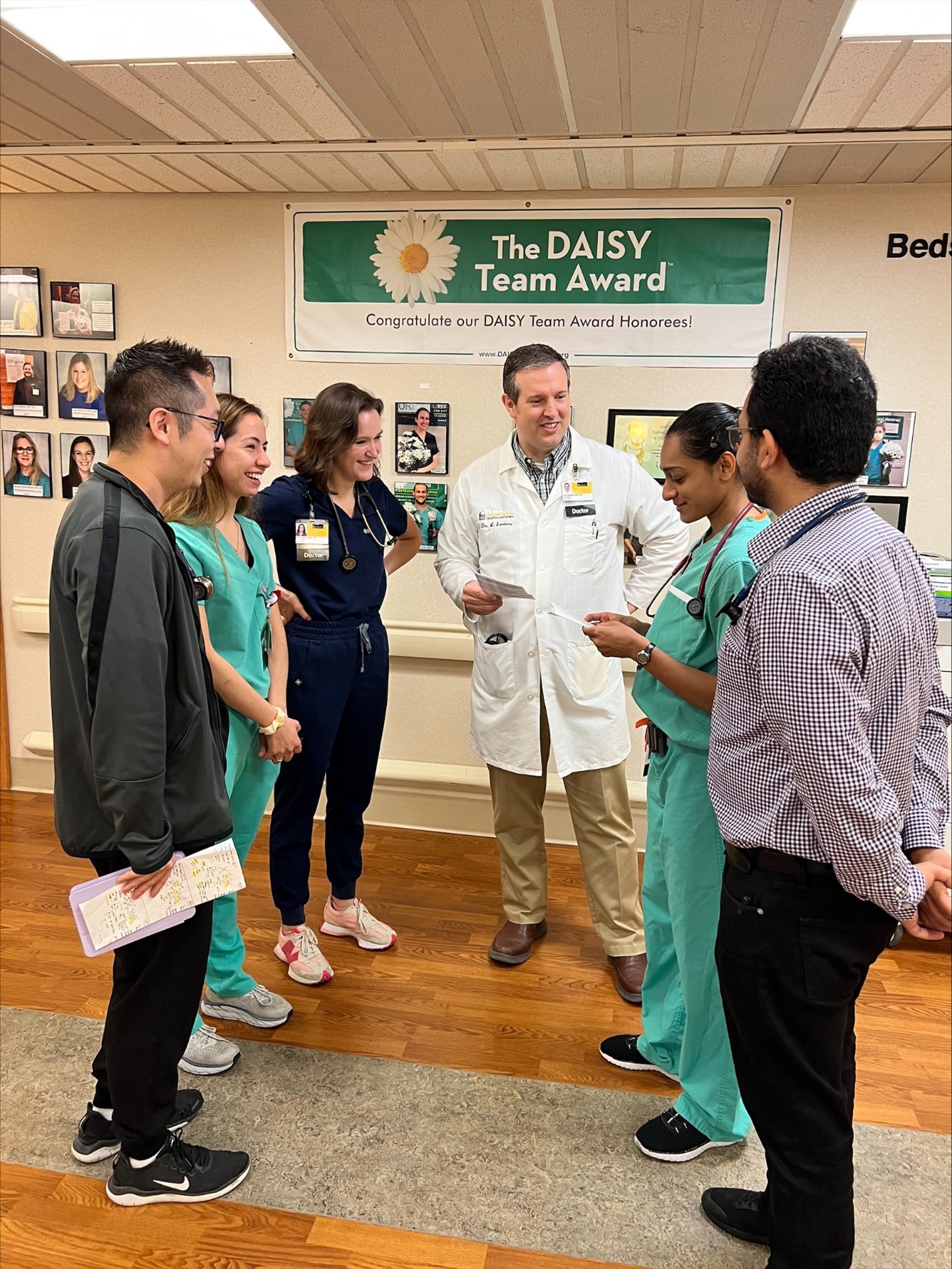 The University of Iowa Hospitals & Clinics Nephrology Consult Services form the core of the fellow's clinical learning experience. Fellows will spend 8-10 months rotating through the 2 consult services in the course of the two-year program. A couple of years ago our traditional one consult service was split into 2 as the volume of consultations increased. The goal of creating an Acute service (acute floor or ICU consults) and Chronic service (all ESRD admissions) was to provide quality and safe patient care in a consultative role and to continue to maintain the education value of the renal consult service for our trainees. The Acute service (Team A) is staffed by 1 renal fellow, 1 nephrology staff and incorporates all resident and student learners. The Chronic service (Team B) is staffed by 1 renal fellow and 1 staff.
The University of Iowa Hospitals & Clinics Nephrology Consult Services form the core of the fellow's clinical learning experience. Fellows will spend 8-10 months rotating through the 2 consult services in the course of the two-year program. A couple of years ago our traditional one consult service was split into 2 as the volume of consultations increased. The goal of creating an Acute service (acute floor or ICU consults) and Chronic service (all ESRD admissions) was to provide quality and safe patient care in a consultative role and to continue to maintain the education value of the renal consult service for our trainees. The Acute service (Team A) is staffed by 1 renal fellow, 1 nephrology staff and incorporates all resident and student learners. The Chronic service (Team B) is staffed by 1 renal fellow and 1 staff.
For each of these services, the fellow assumes significant responsibility for running the Nephrology Consult Service. Under the supervision of the attending nephrologist, the fellow will oversee the daily management and diagnostic evaluation of all patients on whom the service consults and learn how to manage acid base and electrolyte disorders, acute and chronic kidney disease, hypertension, intoxications, and other renal-related diseases. The fellow’s responsibilities will include decisions regarding initiation of dialysis, selection of modality and writing and/or supervising dialysis prescription for patients with acute kidney injury. The fellow will become familiar with all the modalities of continuous renal replacement therapy (CRRT), the role of hemoperfusion in the management of drug intoxication and the use of ultrafiltration techniques. In addition, the fellow will also become adept at percutaneous renal biopsies. The fellow will also be intimately involved in teaching medical students and residents on the nephrology consult A team and will function as a liaison between the consultation service at UI Hospitals & Clinics and the referring physicians/teams.
Consultation Service VAMC
The Iowa City Veterans Affairs Medical Center, conveniently situated adjacent to the University of Iowa Hospitals, plays a vital role in our nephrology fellowship program. As part of the program, the nephrology fellow assumes responsibility for overseeing three essential services at the Iowa City VA Health Care System: inpatient consults, outpatients in the renal clinic, and organizing and performing procedures. This collaborative engagement with the VA offers an exceptional opportunity for fellows to gain extensive exposure to the distinctive aspects of nephrologic care specifically tailored to this patient population.
At the VA, fellows participate in a general nephrology clinic that provides valuable insights into the distinctive characteristics of care required by Veterans. The patient population at this clinic predominantly consists of individuals with chronic kidney disease, renovascular hypertension, diabetes, and geriatric renal disease, with a higher representation of male patients. This exposure allows fellows to acquire a comprehensive understanding of managing renal conditions in this specific demographic.
By integrating the Iowa City Veterans Affairs Medical Center into our nephrology fellowship program, we aim to offer fellows an immersive experience that encompasses the intricacies of nephrology care within the context of Veteran healthcare. This exposure not only enhances fellows' clinical competence but also cultivates a deep appreciation for the unique challenges and considerations that arise in the care of Veterans with renal conditions.
Transplant Service, UIHC and VAMC
Inpatient Transplant Service
Kidney and kidney pancreas transplant services are provided at the University of Iowa Organ Transplant Center and at the affiliated VA Transplant Center. The University of Iowa transplant program is the only multi-organ transplant program (Kidney, Liver, Pancreas, Heart, Lung) in the State of Iowa. The VA transplant center is one of a handful of VA programs that perform kidney transplants and the only center that performs kidney pancreas transplants.
Stable transplant inpatients are cared for on a multidisciplinary transplant unit where Transplant Nephrology has admitting privileges and primary responsibility for patients admitted to the Transplant Nephrology Service. Transplant Nephrology also provides consultative services to Transplant Surgery and Transplant Hepatology as well as patients with kidney and liver transplants who are admitted to all other services including critical care units. The renal division has an AST accredited transplant nephrology fellowship program where 1 fellow is admitted per year.
Each general nephrology fellow will be assigned for 3 to 4 months on this transplant service, working with one of the Transplant Nephrology staff on the inpatient service and with several staff in the Transplant outpatient clinics, sometimes alongside the Transplant Nephrology fellow. During the course of the rotation the fellow will learn the indications and complications of transplantation, the psychological impact of transplantation, and the principles of histocompatibility testing relevant for kidney transplantation. The fellow will also be exposed to the process of assessing suitability for living-related donor transplantation and will acquire an understanding of the modes of action, pharmacology, and complications of immunosuppressive drug regimens.
By being involved in the workup and management of graft dysfunction, the fellow will learn to recognize the clinical pathology of acute and chronic rejection, drug toxicity, and recurrent primary disease and will gain experience in the needle biopsy of the transplanted kidney. In addition to the day-to-day management of the organ transplant service inpatients, the fellow will participate in the Outpatient Transplant Clinic and the Transplant Conferences.
Transplantation Clinics
The Transplantation clinics at the University of Iowa Hospitals & Clinics and VAMC provide the opportunity for the fellow to participate in the outpatient evaluation of the pre-transplant patient and potential donors, as well as the immediate and long-term management of the immunosuppressive therapies and complications of the post-transplant patient.
Renal Ambulatory Clinics
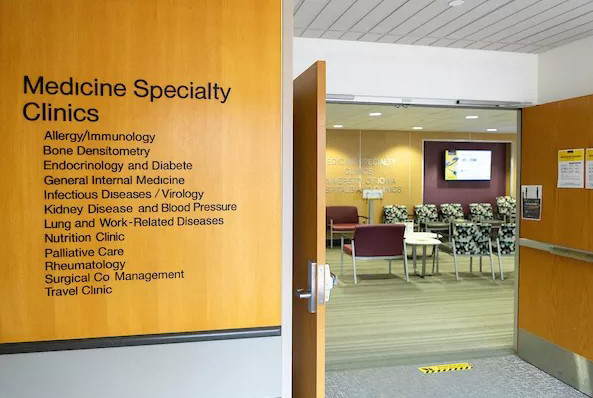 During the course of the year, the nephrology fellow will rotate through several outpatient nephrology clinics. The individual clinics emphasize different areas of nephrology, allowing the fellow to participate in all aspects of outpatient care.
During the course of the year, the nephrology fellow will rotate through several outpatient nephrology clinics. The individual clinics emphasize different areas of nephrology, allowing the fellow to participate in all aspects of outpatient care.
The Continuity of Care (COC) clinic meets weekly for a half day and actively involves the fellow in the long-term management of renal-related problems. In this clinic, individual patients will be followed by a specific fellow for the course of his or her fellowship training. Each patient will also be staffed by an attending nephrologist; however, the fellow is responsible for making diagnostic and therapeutic decisions, contacting the patient with test results, and functioning as the primary nephrologist for the care of the renal problems. Increased responsibility will be given as the fellow advances through the training program.
The Rare Renal Disease and the Renal Genetics Clinic is a multidisciplinary clinic staffed by specialists in adult nephrology, pediatric nephrology, genetic counseling, renal nutrition and social and financial support personnel. The clinics have a national and international reputation in treating complement-medicated renal diseases, atypical hemolytic uremic syndrome and C3 glomerulopathies. In addition, the clinics have a longstanding collaboration with the Iowa Institute of Human Genetics and Molecular Otolaryngology and Renal Research Laboratory (under the scientific direction of Dr. Richard Smith), which provides onsite comprehensive state of the art genetic testing, functional complement assays and molecular diagnostic tools to facilitate evaluation of genetic and acquired abnormalities that form the bases of rare kidney disease.
 The Renal Stone Clinic is a clinic at the Iowa River Landing (IRL) that guides the metabolic evaluation of the patient with nephrolithiasis and provides management strategies for prevention (pharmacologic, dietary and lifestyle modifications) and definitive treatment (urology referral) of stone disease.
The Renal Stone Clinic is a clinic at the Iowa River Landing (IRL) that guides the metabolic evaluation of the patient with nephrolithiasis and provides management strategies for prevention (pharmacologic, dietary and lifestyle modifications) and definitive treatment (urology referral) of stone disease.
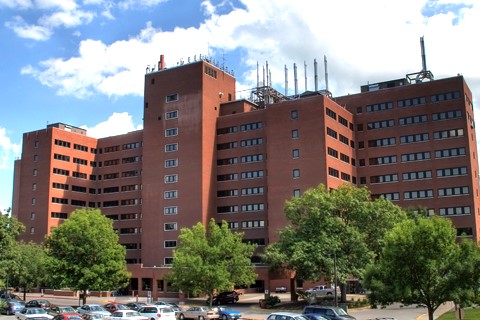 The Veterans Administration Clinic is a general nephrology clinic with a patient population with a predominance of chronic kidney disease, renovascular hypertension, diabetes and geriatric renal disease, and with a higher representation of male patients. The exposure allows fellows to acquire a comprehensive understanding of managing renal conditions in this specific demographic.
The Veterans Administration Clinic is a general nephrology clinic with a patient population with a predominance of chronic kidney disease, renovascular hypertension, diabetes and geriatric renal disease, and with a higher representation of male patients. The exposure allows fellows to acquire a comprehensive understanding of managing renal conditions in this specific demographic.
The Transplantation clinics at the University of Iowa Hospitals & Clinics and VAMC provide the opportunity for the fellow to participate in the outpatient evaluation of the pre-transplant patient and potential donors, as well as the immediate and long-term management of the immunosuppressive therapies and complications of the post-transplant patient.
Dialysis Program
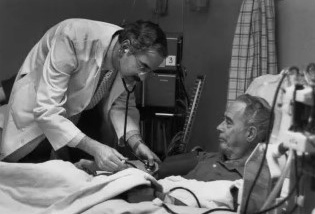 Our dialysis program, under the leadership of Dr. Mony Fraer, gives our fellows an in-depth exposure to the main modes of outpatient dialysis therapies, center and home (hemodialysis and peritoneal dialysis), enabling them to formulate realistic strategies to select the option most suited to their ESRD patients. Care for the ESRD patient involves a multidisciplinary team approach that includes the fellow, staff nephrologist, social worker, dietician, and nurses.
Our dialysis program, under the leadership of Dr. Mony Fraer, gives our fellows an in-depth exposure to the main modes of outpatient dialysis therapies, center and home (hemodialysis and peritoneal dialysis), enabling them to formulate realistic strategies to select the option most suited to their ESRD patients. Care for the ESRD patient involves a multidisciplinary team approach that includes the fellow, staff nephrologist, social worker, dietician, and nurses.
Center Dialysis
The fellow will be rotating through the outpatient dialysis unit at the University of Iowa Hospitals and Clinics during their B Consult blocks. Once weekly for 6 months they will rotate on one staff dialysis shift, with the shifts rotating every 6 months to provide the opportunity to work with different staff. This continuity of care allows the fellow to experience the day-to-day management of the ESRD patients on maintenance dialysis. The fellow will round once weekly with the staff while on the B service at a set time and will gradually assume independent responsibility in decision-making for these patients over the 2 year period. All facets of patient care will be covered, including monthly lab review, adjustments in dialysis prescriptions, dietary recommendations, evaluation of access problems and social issues.
Home Dialysis Program
We currently have about 30 patients on home therapies (hemodialysis or peritoneal dialysis) in our program (one of the longest-running in the country). Each patient is seen monthly in the clinic by the assigned staff and fellow. For those patients beginning training for home therapies, the fellow rounds once weekly with the staff and makes any necessary changes in the treatment plan.
Continuous Renal Replacement Therapies
Over the course of your training, the fellow will become familiar with all the modalities of continuous renal replacement therapy (CRRT), the role of hemoperfusion in the management of drug intoxications, and, with the use of ultrafiltration techniques for patients requiring this modality.


